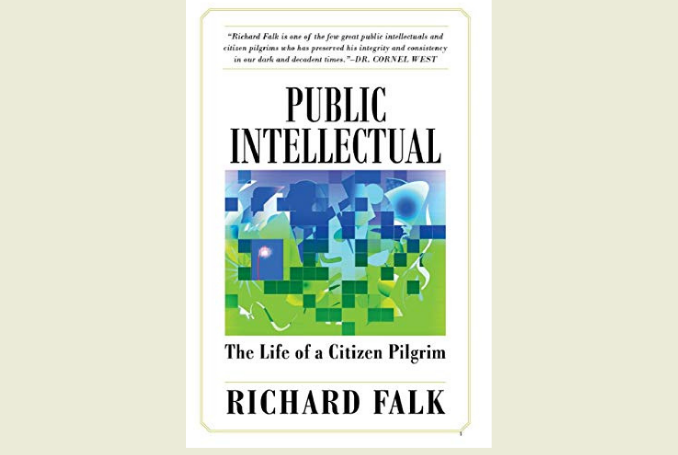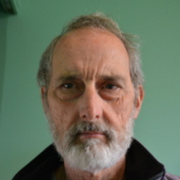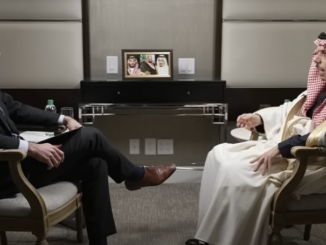
By Jim Miles
(Public Intellectual: The Life of a Citizen Pilgrim. Richard Falk. Clarity Press, Atlanta, GA. 2021)
Writing an autobiography after experiencing the greater part of a century as a public intellectual has resulted in Richard Falk’s superbly written story covering many of the major events of the Twentieth and nascent Twenty-first Centuries. Public Intellectual is densely written with ideas and actions interlocking with each other, presenting a life lived with integrity, all the while illuminating both the personal life and public life of a citizen pilgrim.
Falk writes with an honesty and humility that reinforces his varied thoughts; he displays a sense of humor, mostly at his own personal life; and above all he writes with passion about the many people and events he encountered and about the ideas and thoughts generated by his intense interest in human rights.
Human rights are the center of his ideas, and part of the germination of his ideas comes from his academic career in which he becomes disillusioned with the main motivating factor of many of his colleagues in academia. The “great universities” – Harvard, Yale, Princeton, Penn – “could be interpreted as privileged centers of learning and elite socialization where the resources of knowledge are put directly and even more so indirectly, at the service of power, wealth, and privilege.”
When discussing the campus activism of the Vietnam war he realized “how out of touch I was…with an American political culture…endorsing nationalistic, militarist, and capitalist priorities, while being slow to overcome injustices associated with race, gender and class.”
Throughout his career, Falk visited many of the world’s hot spots, mainly at the invitation of interests who knew his background in international law and human rights. His travels took him to Vietnam several times, during and after the war; he visited Iran during its era of turmoil at the end of the Shah’s regime and the beginning of the religious Ayatollahs; and he has strong personal and academic ties with Turkey and provides strong insights into its recent events.
Israel and Palestine
Above all, “On no issue has the personal and political been more intertwined in my life experience, especially since the turn of the 21st Century, than with respect to the long struggle involving Palestine and Israel.”
Falk is Jewish although his identity with “being Jewish was weak.” He remembers “uncritically accepting the early glamorization of Israel…heroically prevailing against much larger neighboring Arab countries…making the desert bloom…and mostly populated by happy young people…creating an emerging utopia…that would bring modernity to the region….” That narrative, supported by the media, politicians, and academics of the west dissipated gradually as Falk’s experiences exposed him increasingly to the real plight of the Palestinians.
From his academic/legal perspective he examines the role of the “insidious settlements” violating “the letter of Article 49(6) of the Fourth Geneva Convention,” making the “Israeli abuse of its occupation role particularly flagrant….International law sides with the Palestinians, but sufficient political will…is absent, being effectively neutralized by Israel and the United States.” He started his assignment as UN Special Rapporteur for Palestine with the country already identified by the previous rapporteur as “characteristic of European colonial structures and as dependent on apartheid structures for control of the Palestinian territory.”
Falk summarizes his experiences in Palestine/Israel very succinctly, “I favor binational coexistence based on equality, mutual respect, and human rights.” He sees a “focus on the Palestinian people as a whole remains critical for genuine peace efforts,” as “the Palestinian refugee families are the unjust consequence of ethnic cleansing in the 1948 war and subsequently.”
He ends on a personal note after discussing the many ramifications of his experiences concerning Palestine, “I am neither as alienated and traitorous as my critics contend nor as brave and formidable as my admirers insist.”
Closing Essays
Towards the end of Public Intellectual, Falk demonstrates that his intellect has kept up with the changing era.
In contradiction – as usual – to much of the mainstream media and academia, he is reasonably positive about the rise of China juxtaposed to the decline of the U.S. It starts with a commentary on U.S. exceptionalism, at which he “instinctively recoils” and “Unless the underlying structures of predatory neoliberal capitalism and global militarism are challenged from below by a movement not beholden to the established two-party hegemonic control of political life…there will be no hope of arresting the decline and fall of the United States at home and internationally.”
On the purely economic front “China confirms the remarkable materialist potential of a modified capitalist framework intelligently adopted by state policies to market opportunities.” He then says, “China, among major states, is the only country orienting its development strategies toward soft power ascendancy…and for that reason alone it threatens its geopolitical rivals, above all, the United States.” In context, the phrase is used within the context as well of an ecologically “secure” life for “people in their homelands.” The argument continues later, wherein the “militarist approaches to foreign policy [are] augmenting their destructive and human costs. The fact that China and Asia understand this…helps explain China’s rise and the West’s decline.”
Perhaps it is an impasse he has not yet figured out: how the market opportunities even in a modified capitalist framework align with his concern that “the human future depends on achieving as sustainable, globalized, and equitable future, including radically reformed relationships between human activity and the natural environment sensitive to the carrying capacity of the earth.”
As a “citizen pilgrim” it is incumbent to continue to understand, to modify one’s thinking and actions, and to choose the pathways that are revolutionary towards a peaceful sustainable future.
Richard Falk has lived an amazing life, not content to accept the status quo, and more, to accept the disregard and rebukes that come with positions that challenge the comfort of the elites – the politicians, the academics, the militarists, and the businessmen. Public Intellectual is a dense read from a lifetime of academic and human rights issues lived fully, and is a must-read for a unique view and understanding of many of the events of the past century.
This is an amazing book, well written and challenging, well worth the intense read.

– Jim Miles is a Canadian educator and a regular contributor/columnist of opinion pieces and book reviews to Palestine Chronicles. His interest in this topic stems originally from an environmental perspective, which encompasses the militarization and economic subjugation of the global community and its commodification by corporate governance and by the American government.







